
- All Instrument Types
- Indices
- Equities
- ETFs
- Funds
- Commodities
- Currencies
- Crypto
- Bonds
- Certificates
Please try another search

2020 vision: Will the business world produce the next U.S. president too?
President Donald Trump’s rise from the business world to the Oval Office as a political outsider has imaginations running wild ahead of the 2020 election. Who might be the next unconventional commander-in-chief?
Here at Investing.com, we took Americans’ pulse on that issue by surveying over 1,400 respondents on what factors they thought were most important to a successful business leader, whether this could also form the makeup of an ideal presidential candidate and if so, which business leader would be their number one pick.
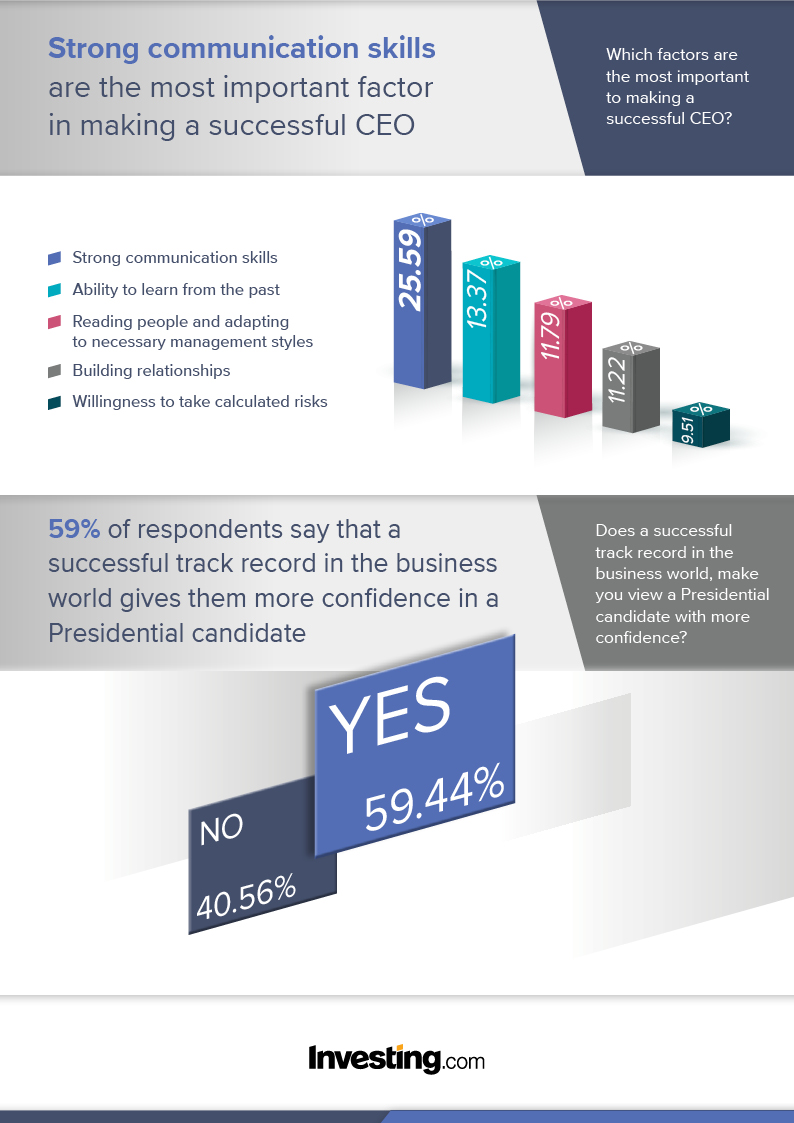
Trump setting the precedent
When asked if a successful track record in the business world made the U.S. public view a presidential candidate with more confidence, 60% of people replied yes. President Trump’s success within the business world was long touted as a key ingredient to his successful campaign, and with 61% of people still believing him to be a successful businessman, this is a popular consensus that continues to resonate among U.S. voters. Furthermore, 55% believe that President Trump’s experience within the business world has helped him during his time as president.
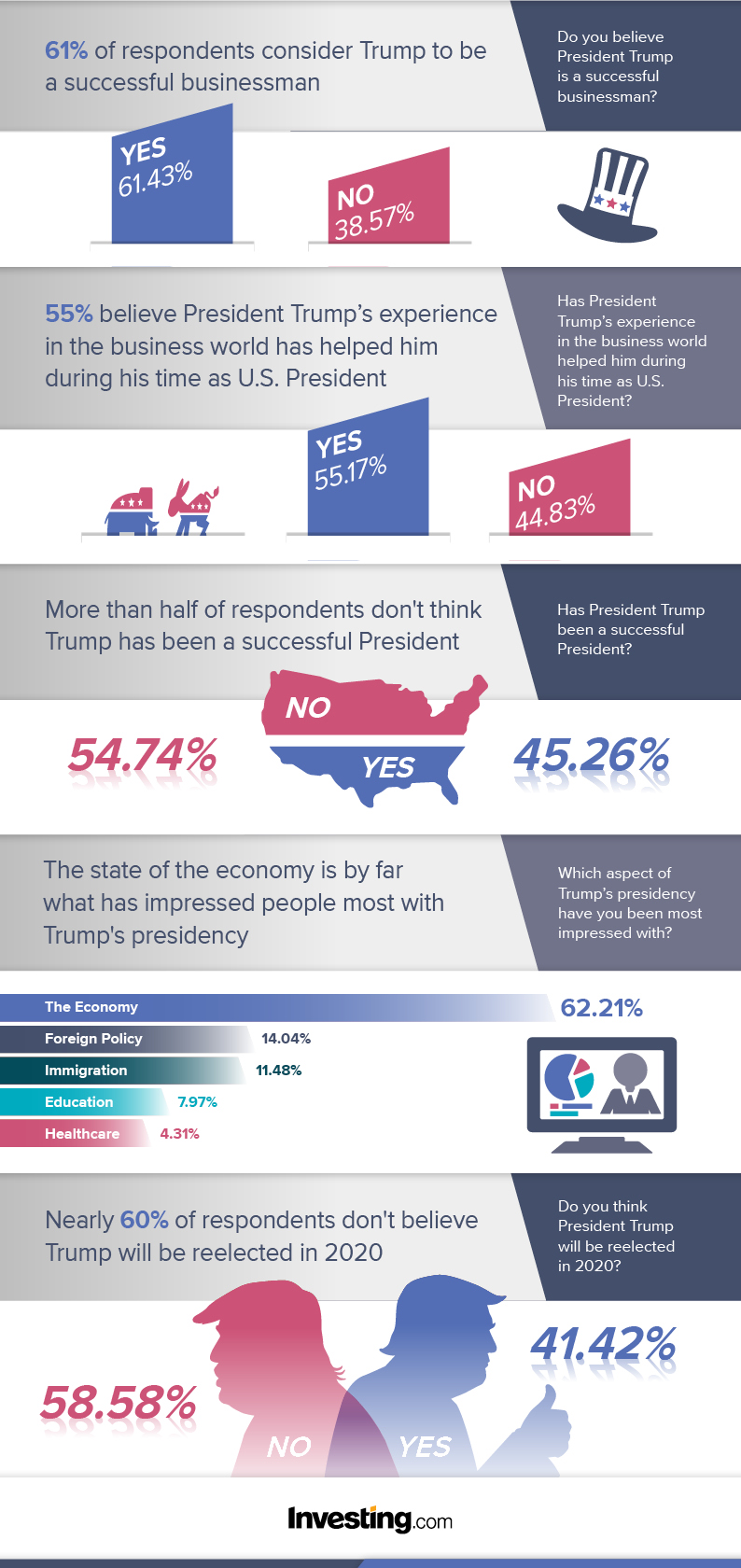
Despite recent turbulence increasing caution among investors, President Trump can claim title to overseeing the strongest market performance in the first two years following his election of any president in the past 50 years. With 62% of respondents citing Trump’s performance improving the economy as the aspect they’ve been most impressed with, the public seems aligned with the President’s own preferred scorecard of his administration’s policies. If a strong stock market performance is indeed key to a successful presidential term, the U.S. may well look to the business world once again in 2020.
So who’s next?
Whether that man in 2020 is President Trump however, isn’t as clear. 55% of respondents don’t believe he has been a successful president and 59% don’t believe he will be reelected for a second term. So which current business leaders do U.S. voters want to see in the running a year from now?
Former Starbucks CEO Howard Schultz, who has said he is “seriously thinking of running for president” as an independent and was the lone business leader on our list who has made such a declaration, was only the 8th-most-popular choice at 2.5 percent. Yet Microsoft co-founder Bill Gates, who has specifically disavowed a presidential run in 2020, was respondents’ top pick at 30.5 percent. After Gates, Oprah Winfrey (15.7 percent), Michael Bloomberg (10.5 percent), Elon Musk (10.2 percent), and Mark Cuban (9.7 percent) rounded out the top five.
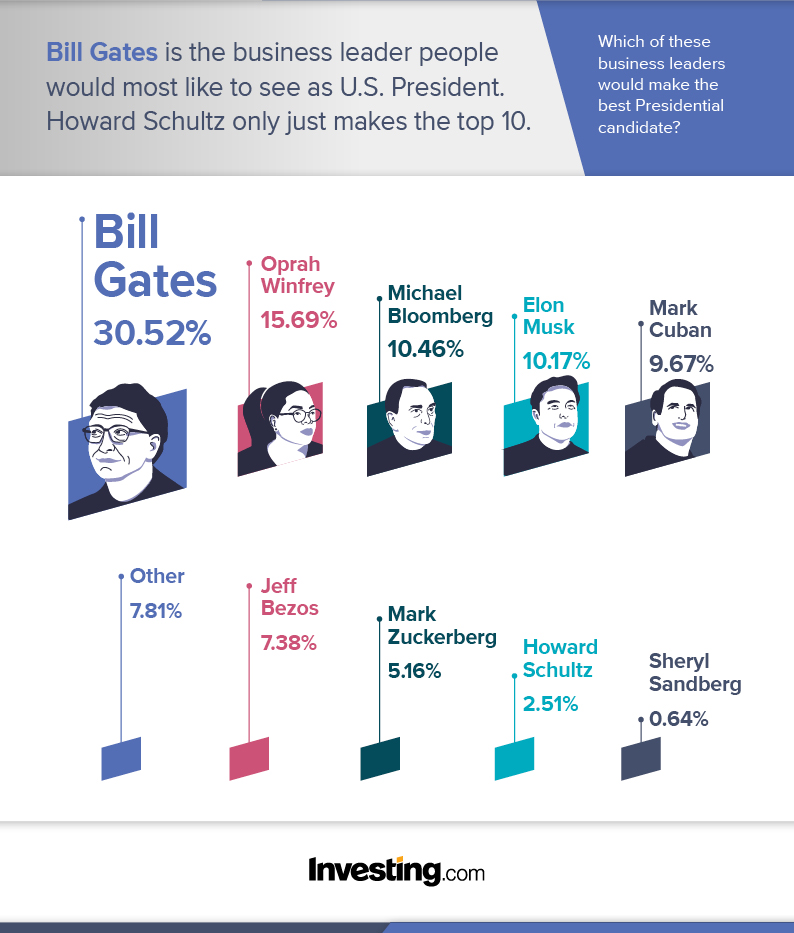
Bloomberg’s performance in the survey is arguably unsurprising — he has actual experience in government, having served three terms as New York City’s mayor, and 60.9 percent of our respondents believe political experience is the most important factor in making a presidential candidate (followed by a successful business background at 25.3 percent). Oprah, meanwhile, has been floated as a potential presidential contender for years.
But what explains respondents’ preference for Gates, who has explicitly ruled out a campaign? “I won’t be running for President because I am super committed to the work Melinda and I are doing at the Foundation and outside the Foundation,” Gates said on Reddit in February 2018. “I agree it is important to have a President who thinks long term about the U.S. role in the world and the research to solve disease burdens and costs and to tackle climate change and improve education.”
He continued, “I do think people are expecting too much from Government. Yes, Government can do better but local groups can do a lot that government can’t — helping out in schools, reaching out to people in poverty. This is also true internationally. I would like to see this civil society sector step up a lot more. Some issues like abortion or even immigration we may never get a consensus on but there are things like better health and better education that we can achieve.”
It seems then that Gates does indeed have a concrete vision for the president’s role, whether or not he changes his mind about throwing his hat in the ring. As it turns out, his comments on healthcare and education address issues which only 4.3 and 8 percent of our respondents, respectively, have been “most impressed with” when it comes to aspects of Trump’s presidency.
Maybe Gates’s un-Trumpian low public profile is attractive to Americans as a stark contrast in the age of the outspoken former “Apprentice” host, or perhaps he has a “forbidden fruit” quality given his stated intent not to run.
Looking abroad
Moving on to a scenario which might not have a chance of materializing, but still lends insight into Americans’ views on governance, we asked which world leaders would make the best U.S. president.
Respondents looked directly north of the border through their overwhelming top choice — Canadian Prime Minister Justin Trudeau at 40.2 percent. He was followed by German Chancellor Angela Merkel (14 percent), British Prime Minister Theresa May (13.1 percent), Israeli Prime Minister Benjamin Netanyahu (8.2 percent), and Russian President Vladimir Putin (7.4 percent).
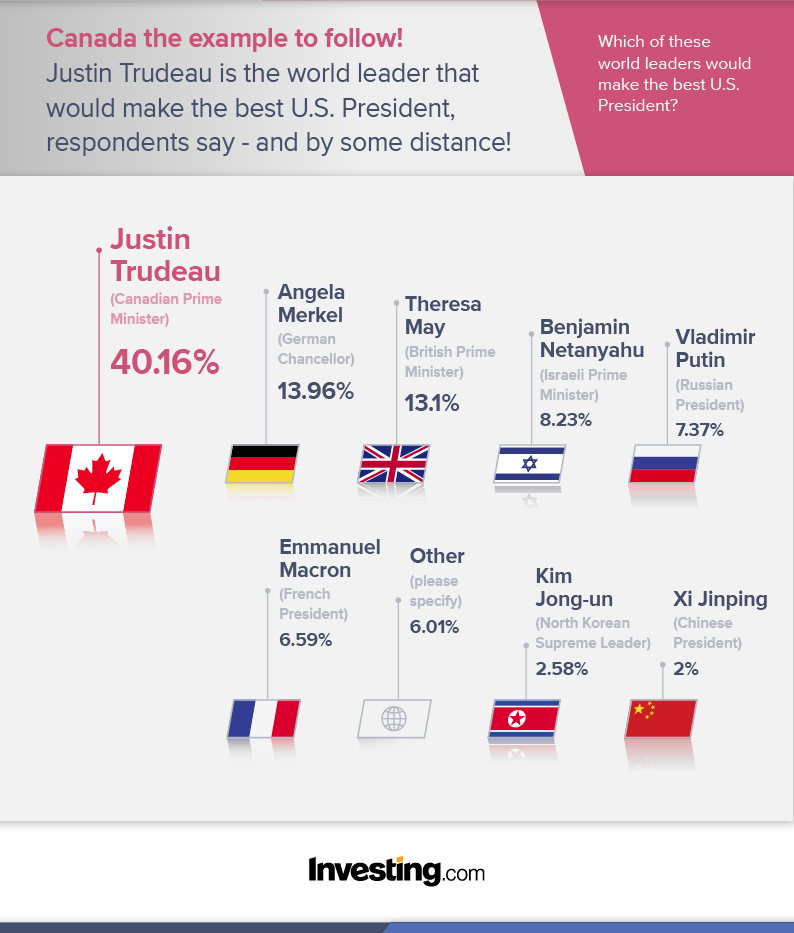
While Trump’s “bromances” with Putin and Netanyahu are well-documented, these results show that despite the current presence of a political conservative in the White House, the #BlueWave we witnessed during the November 2018 midterm elections could be a harbinger of things to come. It begs the question: Is our respondents’ preference for a progressive leader like Trudeau good news for the Democratic nominee in 2020?
Fiction in real life
Finally, allowing imaginations to run even wilder, we asked which fictional TV character would make the best U.S. president. Josiah Bartlet (played by Martin Sheen) of “The West Wing” led the pack at 21 percent, followed by Tom Kirkman (Kiefer Sutherland) of “Designated Survivor” at 19.8 percent, Selina Meyer (Julia Louis-Dreyfus) of “Veep” at 15.4 percent, David Palmer (Dennis Haysbert) of “24” at 14.1 percent, and the notoriously corrupt and ruthless Frank Underwood (Kevin Spacey) of “House of Cards” at 11 percent.
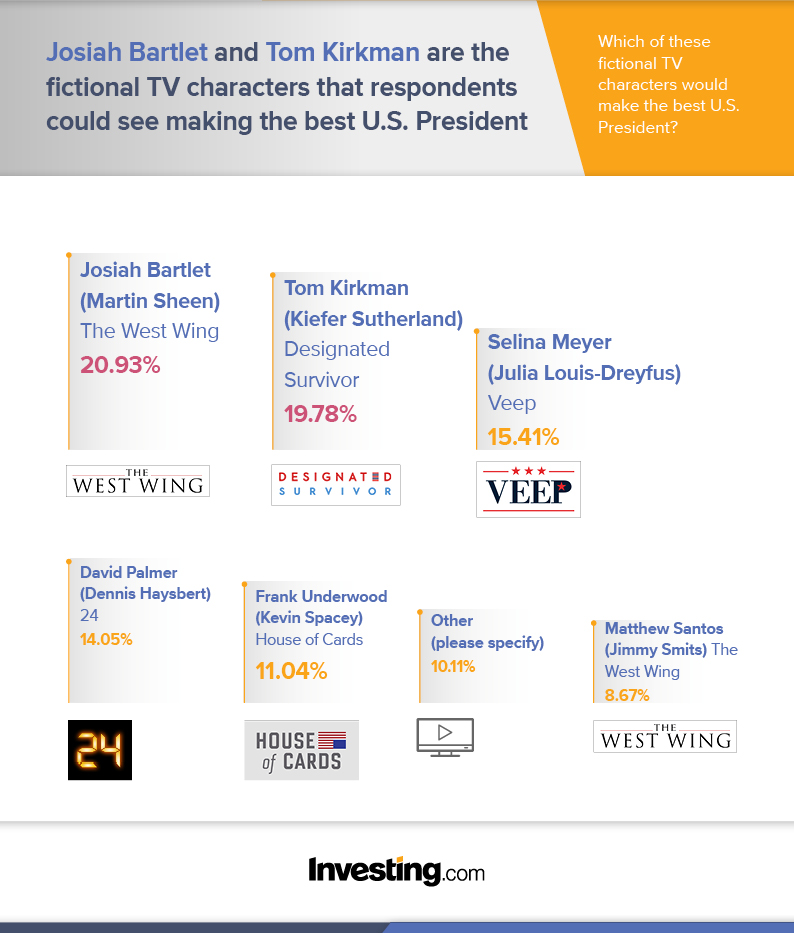
Yet many Americans — especially President Trump’s critics — would probably say that their current political reality is more dramatic and far-fetched than any TV sitcom.
Are you sure you want to block %USER_NAME%?
By doing so, you and %USER_NAME% will not be able to see any of each other's Investing.com's posts.
%USER_NAME% was successfully added to your Block List
Since you’ve just unblocked this person, you must wait 48 hours before renewing the block.
I feel that this comment is:
Thank You!
Your report has been sent to our moderators for review





Add a Comment
We encourage you to use comments to engage with other users, share your perspective and ask questions of authors and each other. However, in order to maintain the high level of discourse we’ve all come to value and expect, please keep the following criteria in mind:
Enrich the conversation, don’t trash it.
Stay focused and on track. Only post material that’s relevant to the topic being discussed.
Be respectful. Even negative opinions can be framed positively and diplomatically. Avoid profanity, slander or personal attacks directed at an author or another user. Racism, sexism and other forms of discrimination will not be tolerated.
Perpetrators of spam or abuse will be deleted from the site and prohibited from future registration at Investing.com’s discretion.